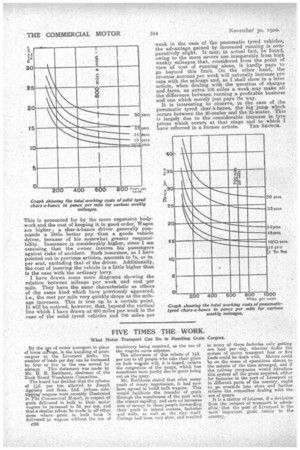FIVE TIMES THE WORK
Page 20

If you've noticed an error in this article please click here to report it so we can fix it.
What Motor .Transport Can Do in Handling .Crain Cargoes.
By the nAse of motor transport in place of horse cottage, lathe -handling of grain cargoes at the Liverpool docks, the number of loads per day can be increased by four or five to the one moved by cartage. This statement was made by Mr. H. R. Rathboner chairman of the Dock Board Warehouse Committee.
The board has decided that the rebates
of lid. per ton allowed to Joseph Appleby and Sons, Ltd. (whose sidetipping wagons were recently illustrated in Ths Commercial Motor), in respect of grain delivered in bulk to their motor wagons be increased to 3d. per ton, and that a similar rebate be made in all other cases where grain in bulk form is delivered to wagons without the use of
machinery being required, as the use of the wagons saves expense.
The allowance of this rebate of 14.d. per ton to all people who take their grain on bulk wagons will, it is hoped, relieve the congestion of the quays, which has sometimes been partly due to grain being out on the quay. Mr. Rathbone stated that after many year's of weary negotiation, it had now been agreed to build bulk wagons. This would facilitate the transfer of grain through the warehouses of the port with. the utmost rapidity, and save an immense sum of money to those people forwarding their grain to inland centres, factories and mills, as well as the city itself. Cartage had been very slow, and resulted in many of these factories only getting one load per day, whereas under the system of motor transport four or five loads could be dealt with. Motors could 'be on the scene of operations almost to the minute of the time arranged, and if the railway companies would introduce this system all the, grain required, either for factories in the port of Liverpool or in different parts of the country, ought to go overside into store and further relieve the committee dealing with the use of quays. It is a matter of interest, if a deviation from the subject of transport is admissible, that the port of Liverpool isthe most important grain centre in the country.




























